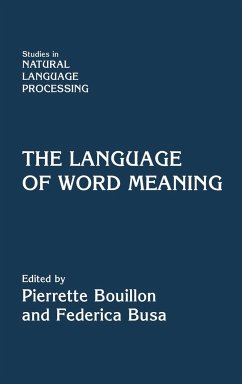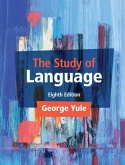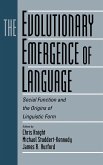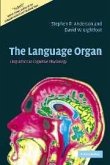This volume is a collection of original contributions from outstanding scholars in linguistics, philosophy and computational linguistics exploring the relation between word meaning and human linguistic creativity. The papers present different aspects surrounding the question of what is word meaning, a problem that has been the center of heated debate in all those disciplines that directly or indirectly are concerned with the study of language and of human cognition. The discussions are centered around the newly emerging view of the mental lexicon, as outlined in the Generative Lexicon theory (Pustejovsky, 1995), which proposes a unified model for defining word meaning. The individual contributors present their evidence for a generative approach as well as critical perspectives, which provides for a volume where word meaning is not viewed only from a particular angle or from a particular concern, but from a wide variety of topics, each introduced and explained by the editors.
Table of contents:
1. Preface James Pustejovsky; 2. Introduction: word meaning and creativity Pierrette Bouillon and Federica Busa; Part I. Linguistic Creativity and the Lexicon: 3. Introduction Federica Busa and Pierrette Bouillon; 4. Chomsky on the creative aspect of language use and its implications for lexical semantic studies James McGilvray; 5. The emptiness of the lexicon: critical reflections on J. Pustejovsky's 'The Generative Lexicon' Jerry A. Fodor and Ernie Lepore; 6. Generativity and explanation in semantics: a reply to Fodor and Lepore James Pustejovsky; 7. The 'Fodor'-FODOR fallacy bites back Yorick Wilks; Part II. The Syntax of Word Meaning: 8. Introduction Federica Busa and Pierrette Bouillon; 9. Type construction and the logic of concepts James Pustejovsky; 10. Underspecification, context selection and generativity Jacques Jayez; 11. Qualia and the structuring of verb meaning Pierrette Bouillon and Federica Busa; 12. Sense variation and lexical semantics generative operations Patrick Saint-Dizier; 13. Individuation by partitive constructions in Spanish Salvador Climent; 14. Event coreference in causal discourses Laurence Danlos; Part III. Interfacing the Lexicon: 15. Introduction Federica Busa and Pierrette Bouillon; 16. Metaphor, creative understanding and the generative lexicon Julius M. Moravcsik; 17. Metaphor in discourse Nicholas Asher and Alex Lascarides; 18. Syntax and metonymy Jerry Hobbs; 19. Generative lexicon meets corpus data: the case of non-standard word uses Adam Kilgarriff; Part IV. Building Resources: 20. Introduction Federica Busa and Pierrette Bouillon; 21. Generative lexicon and the SIMPLE model: developing semantic resources for NLP Federica Busa, Nicoletta Calzolari and Alessando Lenci; 22. Lexicography informs lexical semantics: the SIMPLE experience Nilda Ruimy, Elisabetta Gola and Monica Monachini; 23. Condensed meaning in EuroWordNet Piek Vossen.
This collection of original contributions addresses the problem of words and their meaning. This remains a difficult and controversial area within linguistics, philosophy, and artificial intelligence. The title aims to provide answers based on empirical linguistics methods that are relevant across disciplines and accessible to researchers from different backgrounds.
This collection of original contributions addresses the problem of words and their meaning.
Table of contents:
1. Preface James Pustejovsky; 2. Introduction: word meaning and creativity Pierrette Bouillon and Federica Busa; Part I. Linguistic Creativity and the Lexicon: 3. Introduction Federica Busa and Pierrette Bouillon; 4. Chomsky on the creative aspect of language use and its implications for lexical semantic studies James McGilvray; 5. The emptiness of the lexicon: critical reflections on J. Pustejovsky's 'The Generative Lexicon' Jerry A. Fodor and Ernie Lepore; 6. Generativity and explanation in semantics: a reply to Fodor and Lepore James Pustejovsky; 7. The 'Fodor'-FODOR fallacy bites back Yorick Wilks; Part II. The Syntax of Word Meaning: 8. Introduction Federica Busa and Pierrette Bouillon; 9. Type construction and the logic of concepts James Pustejovsky; 10. Underspecification, context selection and generativity Jacques Jayez; 11. Qualia and the structuring of verb meaning Pierrette Bouillon and Federica Busa; 12. Sense variation and lexical semantics generative operations Patrick Saint-Dizier; 13. Individuation by partitive constructions in Spanish Salvador Climent; 14. Event coreference in causal discourses Laurence Danlos; Part III. Interfacing the Lexicon: 15. Introduction Federica Busa and Pierrette Bouillon; 16. Metaphor, creative understanding and the generative lexicon Julius M. Moravcsik; 17. Metaphor in discourse Nicholas Asher and Alex Lascarides; 18. Syntax and metonymy Jerry Hobbs; 19. Generative lexicon meets corpus data: the case of non-standard word uses Adam Kilgarriff; Part IV. Building Resources: 20. Introduction Federica Busa and Pierrette Bouillon; 21. Generative lexicon and the SIMPLE model: developing semantic resources for NLP Federica Busa, Nicoletta Calzolari and Alessando Lenci; 22. Lexicography informs lexical semantics: the SIMPLE experience Nilda Ruimy, Elisabetta Gola and Monica Monachini; 23. Condensed meaning in EuroWordNet Piek Vossen.
This collection of original contributions addresses the problem of words and their meaning. This remains a difficult and controversial area within linguistics, philosophy, and artificial intelligence. The title aims to provide answers based on empirical linguistics methods that are relevant across disciplines and accessible to researchers from different backgrounds.
This collection of original contributions addresses the problem of words and their meaning.








